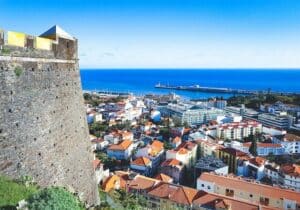Remote working in Portugal has never been more attractive for freelancers and remote workers, considering the low cost of living, internet connectivity, and wide range of activities. Portugal’s Digital Nomad Visa is one of the best options, allowing remote workers to be granted a year-long visa to live and work in Portugal.
If you’re considering being a remote worker to enjoy the perks of working from anywhere in the world, then you should know that Portugal is the perfect location for you. The country is ideal for people to work independently on their own time schedules, enjoy greater travel freedoms, improve their life quality, and even be more productive and creative.
In this article, we’ll explore everything about remote working in Portugal, and you’ll also find out more about:
Why Work Remotely in Portugal?
Portugal has emerged as a top destination for remote workers and offers an excellent opportunity to benefit from the country’s digital nomad and freelancer-friendly environment. In our Global Intelligence Unit’s Global Digital Nomad report, Portugal ranked 7th globally, due to Portugal’s affordable cost of living, excellent infrastructure, and high quality of life.
Remote jobs exist in almost every industry today, and some common roles that fit well with the remote work lifestyle are SEO specialists, social media managers, web designers, and language instructors.
In addition to Portugal’s excellent weather, the country offers a relatively low cost of living, compared to many Western European countries, enabling remote workers to enjoy a high quality of life at an affordable price.
It also has a robust healthcare system. Expat health insurance ensures comprehensive coverage, which is essential for peace of mind while living abroad. But the best part is that remote workers in Portugal can eventually apply for permanent residency after five years and citizenship after six years, offering long-term stability.
Moving To Portugal As A Remote Worker
EU-EEA Nationals
Citizens of European Union (EU) and European Economic Area (EEA) countries have the advantage of freedom of movement within the EU. This means they can live and work in Portugal without the need for a specific work visa. However, if you plan to stay longer than 90 days, Portuguese law requires you to register your residence at the local City Hall and apply for a Certificate of Registration (Certificado de Registo de Cidadão da União Europeia).
Non-EU Nationals
Non-EU nationals interested in remote working in Portugal typically need to obtain a visa or residency permit. Several permits are available, and the choice depends on factors such as the nature of remote work, duration of stay, and individual circumstances.
Visas for Remote Work in Portugal
Portugal Digital Nomad Visa (D8)
The Portugal Digital Nomad Visa is a long-term residency option designed specifically for non-EU/EEA remote workers who wish to live in Portugal while maintaining their employment with companies outside the country. It is the most popular remote working visa in Portugal, enabling you to continue your employment or freelance work for companies or clients outside of Portugal.
It allows you to stay in Portugal for up to one year, with the possibility of renewal. As a D8 Visa holder, you can also travel freely within the Schengen Area, which includes 29 European countries, for up to 90 days within a 180-day period.
Additionally, you can access certain public services in Portugal, including healthcare (with appropriate health insurance) and public transportation. One of the D8 Visa’s subcategories allows for family reunification, meaning you can bring your spouse, children, or other dependents to Portugal under certain conditions.
Entrepreneur Visa (D2)
The Portugal D2 Visa is a Portugal residency visa designed for non-EU entrepreneurs who wish to contribute to the Portuguese economy by buying an existing business or presenting a business plan for new ventures, such as creating a company to work remotely in Portugal for clients abroad.
There is no set minimum investment for the D2 Visa, but you must have sufficient financial resources to start and sustain your business and living expenses in Portugal for a year. The D2 Visa is valid for four months, during which you need to enter Portugal and apply for a residency permit.
Passive Income Visa (D7)
Also known as the Retirement Visa, the Portugal D7 Visa is a residency visa designed for non-EU citizens. While it is particularly favored by non-EU retirees, it is suitable for younger applicants as there is no eligibility age bracket. The residency permit allows you to work remotely for companies outside Portugal. The primary requirement is earning the minimum amount of €870 per month and having €10,440 in a Portuguese bank account. This income can come from various sources, such as:
- Social Security benefits (Pensions)
- Rental income
- Dividends
- Transferable equity
- Intellectual property
How to Apply for Working Remotely in Portugal
While several options allow for working remotely, the Portugal D8 Visa is by far the most popular and is divided into two categories. Remote workers can either apply for a temporary stay (short stay visa) for up to one year or a residency permit that can be renewed for up to five years.
Eligibility criteria
Before applying for the D8 Visa, you must meet several criteria to be successful. Some of the requirements are:
- That you are a non-EU and non-EEA citizen
- Over the age of 18
- Have fully remote work on a permanent contract or freelance basis
- Total income from all sources must be at least €3,480 per month
In addition to the earnings, you need at least €10,440 in a bank account. If applying with family members, the income requirement increases by 50 percent for a spouse or a parent and 25 percent per child.
Applying for the D8 Visa

- Complete the Application for National Visa form with detailed personal and financial information and gather all the relevant documents to support your application.
- Submit your application, supporting documents, and Portuguese Digital Nomad Visa fee at your local Portuguese Consulate. For some countries, you can book an appointment with VFS Global, which operates like a local Portuguese embassy as the official partner of the Embassy of Portugal.
- Once submitted, you should hear back from the authorities in about 60 days. You can track the progress of your Digital Nomad Visa application online with the reference number given to you.
- Upon visa approval, your passport and Portuguese Digital Nomad Visa can be collected from the place where you applied, or you can choose to have them sent to you via secure post. This gives you the right to enter Portugal for up to 120 days.
- After you initially arrive in Portugal, you must attend your scheduled appointment with Portugal’s Agency for Immigration, Migration and Asylum (AIMA) to finalize your residency permit.
Things to Consider as a Remote Worker in Portugal
Digital nomad taxes
Portugal’s Digital Nomad taxes can be complex depending on your residency status and the source of your income. If you stay in Portugal for more than 183 days per year, you are considered a tax resident and must declare your worldwide income. If you stay for less than that, you are typically taxed only on Portuguese-sourced income.
In terms of Double Taxation Agreements (DTA), Portugal has treaties with many countries to avoid double taxation, meaning you may not need to pay taxes twice on the same income. Checking whether your home country has a tax treaty with Portugal is essential.
If you operate as a freelancer or business in Portugal, you may need to register for IVA (VAT) and issue invoices following local tax regulations.
Health insurance for remote workers
Portugal offers universal public healthcare, but access depends on your residency status. If you become a resident and register with Portugal’s social security system, you can access the Serviço Nacional de Saúde (SNS). However, the Portugal healthcare system is sometimes slow, especially for non-urgent care.
Many remote workers opt for private health insurance to avoid long wait times and access better facilities. Plans range from €40–€100 per month, depending on coverage. EU citizens can use the European Health Insurance Card (EHIC) for temporary stays, but long-term residents should get Portuguese coverage. Non-EU nationals will need private insurance to meet visa requirements.
Getting a NIF
Your tax identification number in Portugal is essential for carrying out any economic activity, such as paying taxes, opening a Portuguese bank account, receiving a bank statement, or signing any contract. In short, you need a Número de Identificação Fiscal (NIF) for almost all tax purposes and financial transactions. You can apply for an NIF at a local Finanças (tax office) with a passport and proof of address. Non-EU citizens may need a fiscal representative to obtain it, and if you’re outside Portugal, some online services allow you to apply for an NIF remotely.
Living in Portugal as a Remote Worker
Portugal is a top destination for remote workers, offering a perfect balance of affordability, quality of life, and a welcoming digital nomad community. While there are pros and cons living in Portugal, the stunning landscapes, mild climate, and reliable internet make it an ideal spot to work remotely while enjoying a high standard of living. As a remote worker in Portugal, three key aspects to consider are accommodation, internet, and transport—all of which are well-suited for a flexible and comfortable lifestyle.
Accommodation
As far as accommodation options for remote workers go, there is everything from long-term leases to short-term rentals in Portugal . For short-term stays, platforms like Airbnb, Flatio, and NomadX cater specifically to digital nomads. Prices are generally higher in Lisbon and Porto but drop significantly in smaller cities and coastal towns.
If co-living spaces are better suited to your needs, spaces like Outsite, Selina, and Second Home provide furnished apartments with coworking areas. If you’re planning to stay longer, renting an apartment is a cost-effective option, with monthly rates ranging from €700-€1,500 in Lisbon and Porto, and around €500-€1,000 in smaller towns like Braga or the Algarve.
Keep in mind that certain visas have specific requirements, and the Portuguese authorities will probably not accept short-term accommodation as part of a long-stay visa application.
Internet and connectivity
Portugal has some of the best internet infrastructure in Europe, making it an ideal destination for remote work. Fiber-optic connections are widely available, providing speeds that average between 100 and 500 Mbps in urban areas. Mobile providers like NOS, Vodafone, and MEO offer affordable data plans, including unlimited options that range from approximately €20 to €40 per month.
Many coworking spaces and cafes offer free Wi-Fi for their patrons. Cities like Lisbon and Porto, as well as smaller towns such as Ericeira and Madeira, are seeing a rise in coworking spaces, which typically feature high-speed internet, meeting rooms, and networking opportunities.
Transport
Portugal’s transport system is affordable and well-connected, making it easy to move around. In Lisbon and Porto, metro, buses, and trams are efficient and cost around €40-€50 per month for unlimited travel. Portugal’s rail service offers affordable train routes connecting major cities.
Ridesharing and e-scooter services like Bolt and Uber operate in most cities, and e-scooters are widely available for quick urban trips. If you’re planning to explore more remote areas, long-term car rentals start at €300-€500 per month, or you can use car-sharing services like Free2Move.
Best Locations to Work Remotely in Portugal
1. Lisbon

The city has a well-established network of co-working spaces such as Second Home, Heden, and Avila Spaces, offering high-speed internet and a professional setting. Lisbon’s metro, tram, and bus systems make commuting efficient, and the airport provides direct connections to major cities worldwide.
Lisbon’s appeal also lies in its lifestyle balance. The proximity to beaches in Cascais and Costa da Caparica allows for an easy transition from work to relaxation.
The cost of living is higher than in other Portuguese cities, but it remains more affordable than most Western European capitals. With a rich cultural scene and a growing tech industry, Lisbon is ideal for those who want professional opportunities alongside an active social life.
Best for: Entrepreneurs, startup founders, digital marketers, and creatives looking for a mix of business and lifestyle.
2. Porto
Porto offers the same infrastructure benefits as Lisbon but at a slower pace and with lower living costs. Known for its historic charm and riverside views, Porto provides an excellent setting for remote workers who want a more relaxed work environment without sacrificing amenities.
The city has a number of co-working spaces, including Porto i/o, which has multiple locations in the city, and several independent cafés with reliable WiFi, such as Fábrica Coffee Roasters. The cost of renting an apartment is significantly lower than in Lisbon, making it a good choice for digital nomads who want an affordable yet well-connected city.
The local culture is deeply tied to its food and wine industry. The Douro Valley, famous for its vineyards, is just a short trip away. Porto’s public transport system is efficient, and its airport has direct flights to multiple European destinations, making it easy to travel for work or leisure.
Best for: Remote workers who value affordability, a slower pace, and a strong cultural atmosphere.
3. Madeira

Unlike mainland Portugal, Madeira offers a subtropical climate with warm temperatures year-round. It is a strong choice for professionals who want a peaceful environment, easy access to hiking and outdoor activities, and a close-knit digital nomad community.
The cost of living is slightly higher than in smaller Portuguese towns but remains reasonable compared to other European island destinations.
Funchal, the island’s capital, has modern amenities, reliable internet, and a selection of work-friendly cafés and co-working spaces. Direct flights connect Madeira to Lisbon and Porto, allowing for easy travel to the mainland when needed.
Best for: Remote workers seeking a quieter, nature-focused setting with a strong nomad community.
4. Algarve
The Algarve is known for its coastline, mild climate, and relaxed lifestyle, making it an attractive location for remote workers who prioritize quality of life. While the region is most famous as a tourist destination, towns like Lagos and Faro have developed solid infrastructure for digital workers.
Lagos, in particular, has seen an increase in remote workers, with co-working spaces and networking events becoming more common. The region offers a lower cost of living than Lisbon, particularly for long-term rentals. Faro, the capital of the Algarve, has an international airport, making travel convenient.
For those who prefer outdoor activities, the Algarve has some of Portugal’s best surfing beaches, hiking trails, and water sports. The pace of life here is slower than in the major cities, which suits those looking for a better work-life balance.
Best for: Remote workers who want an affordable, relaxed environment close to the beach.
5. Braga
Braga is one of Portugal’s oldest cities, but it has evolved into a modern hub with strong infrastructure, reliable internet, and a growing remote work community. It offers an affordable alternative to Lisbon and Porto, with significantly lower rental costs and living expenses.
The city has several co-working spaces, including Factory Braga, which attracts freelancers, entrepreneurs, and remote employees. Braga is well-connected to Porto by train, making it easy to access a larger city when needed. The local lifestyle is slower than in Lisbon, but the city still has an active social scene, with plenty of cafés, restaurants, and cultural events.
Braga’s location also offers easy access to nature, with national parks and outdoor activities within a short drive. The cost of living is one of the lowest among Portugal’s major cities, making it a strong choice for remote workers looking to reduce expenses while maintaining access to modern infrastructure.
Best for: Remote workers who want a mix of urban convenience, affordability, and historical charm.
Why choose Global Citizen Solutions for your Immigration Visa?
GLOBAL APPROACH BY LOCAL EXPERTS
- GCS has offices located across Portugal.
- Members of the US-Portugal and UK-Portugal Chambers of Commerce in Portugal, and the Investment Migration Council (IMC).
- Our expert team can help you throughout your journey to secure your Visa.
100% APPROVAL RATE
- Our successful track record in applications provides reassurance to applicants.
- We have helped clients from more than 35 countries secure residency in Portugal.
ALL-ENCOMPASSING SOLUTION
- With a single channel of communication, our approach ensures that you have complete clarity on your application.
- Our BeGlobal® Onboarding System allows for a total flow of information.
TRANSPARENCY AND PRIVACY
- Our pricing is clear and detailed, you will not face any hidden costs.
- All data is stored within a GDPR-compliant database on a secure SSL-encrypted server.
Frequenty Asked Questions about Working Remotely in Portugal
Can I work remotely in Portugal?
If you’re from a European Union or European Economic Area nation, you can begin remote work in Portugal right away. Yet, if you’re not from an EU or EEA country, you’ll require a visa, like the Digital Nomad Visa, permitting remote work in Portugal.
Can I work remotely for a UK company in Portugal?
Yes, working remotely for a UK company in Portugal is possible. Because the UK has left the EU, you must get a residence visa — a visa that enables you to get a residence permit allowing you to work and live in Portugal.
Can I work remotely for a US company in Portugal?
Yes, working remotely in Portugal for a US company is possible, but you’ll need a visa like the Digital Nomad Visa. Make sure to research visa options, tax implications, and the time zone difference.
How can I find remote jobs in Portugal?
To find remote jobs in Portugal, you can use online job boards, freelance platforms, and networking websites tailored for remote work. Additionally, consider reaching out to companies directly, attending virtual job fairs, and joining relevant professional groups to increase your chances of success.
How long can I work remotely in Portugal?
You can work remotely in Portugal for up to one year with the Digital Nomad Visa. This visa allows remote workers earning at least €3,440 per month to stay legally. Extensions are possible, depending on your visa type and legal status in Portugal.
Can I work remotely in Portugal for a month?
Yes, you can work remotely in Portugal for a month with the necessary visa. A practical choice for this situation would be to opt for the Short Stay Visa category within the Portugal Digital Nomad (D8) Visa program.
Is Portugal a good place for digital nomads and remote workers?
Portugal can indeed be an excellent destination for digital nomads and remote workers. With its appealing climate, affordable cost of living, vibrant culture, and growing community of expatriates, it offers a conducive environment for remote work while also providing opportunities for exploration and leisure.
Does Portugal tax remote workers?
Yes, Portugal taxes remote workers. Residents pay taxes on worldwide income, while non-residents are taxed only on Portuguese-sourced income. Remote workers may benefit from the Non-Habitual Resident (NHR) regime, which offers reduced tax rates for ten years.
Where in Portugal do most digital nomads live?
Lisbon and Porto are popular destinations for digital nomads in Portugal. These cities offer vibrant cultural scenes, excellent quality of life, and thriving coworking spaces, making them attractive hubs for remote workers. Additionally, coastal towns like Cascais and Ericeira are also gaining popularity among digital nomads due to their relaxed atmospheres and beautiful surroundings.
Where can an American work in Portugal?
Americans can work remotely anywhere in Portugal with the proper visa. Popular choices include bustling Lisbon and historic Porto, but charming coastal towns or nature getaways work too, depending on your preference.
What is the WFH allowance in Portugal?
In Portugal, there isn’t a set WFH allowance. Legally, companies must reimburse remote employees for home office expenses like internet and electricity. The typical range employers offer is €40-€60 per month.



